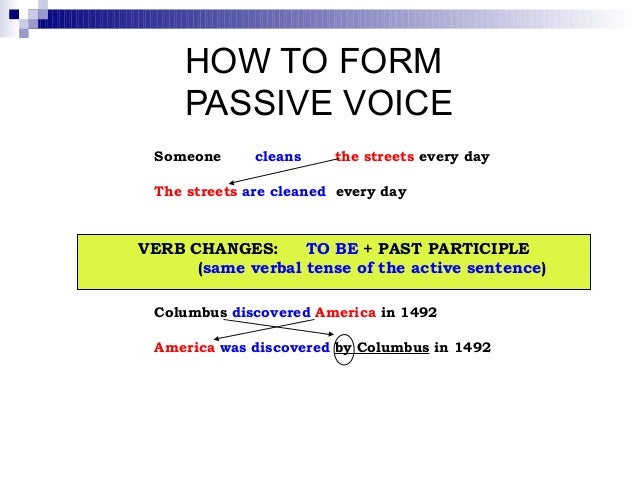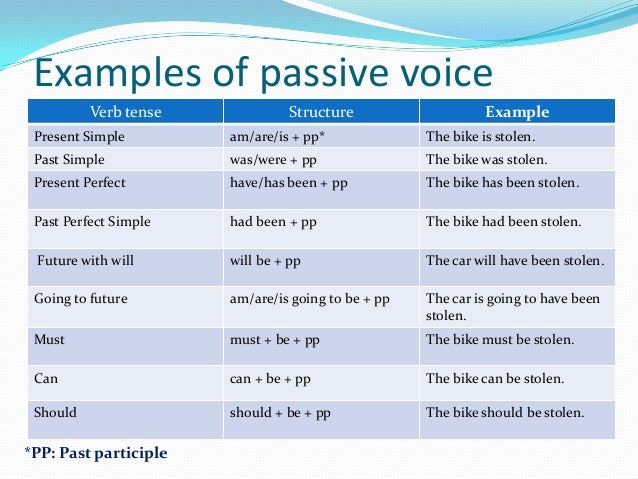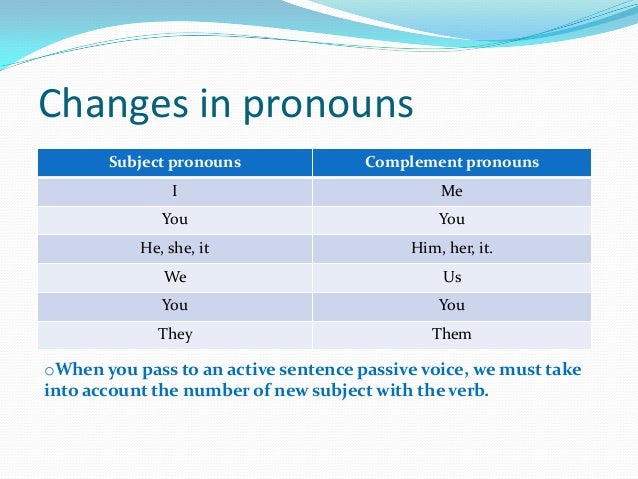¿¿¿¿¿¿¿¿Las Pasivas????????

Yes, I know what you are saying!! Oh my god The Passive Voice!!!!! ¡Qué complicado!
Take it easy, my awesome students because it is a piece of cake!!!!!!
Yes, I’m determined to help you pass with flying colours.🌈 🌈
But, What is "The passive voice"?
USE: " The most important first"
In English, we start a sentence with the most important or most logical information. The focus is put at the beginning:
Someone stole my mobile phone. (active – focus on someone)
My mobile phone was stolen (by someone). (passive – focus on my mobile phone)
So, we use the passive voice to change the focus of the sentence.
In other words, con la pasiva cambiamos "lo más importante o lo que queremos enfatizar primero" y, por tanto, el sujeto de la activa ya no es tan importante y por eso lo ponemos al final.
AGENT:" 👋👋 bye-bye AGENT!"
Who or what does the action, the subject of the active, is the AGENT of the passive and is preceded by the preposition "by". The agent is usually omitted when:
- Unkown agent:
- Obvious agent:
- " don't want to say" agent:
FROM ACTIVE TO PASSIVE: "step by step"
Become a PASSIVE pro and follow these steps:

"STEP BY STEP": 3 steps
1. NEW SUBJECT: El objeto de la oración activa pasa a ser el sujeto de la pasiva.
Santiago Segura directed "A todo tren"
"A todo tren" was directed by Santiago Segura.
Watch out!⚠️⚠️ subject-verb agreenment.
Santiago Segura directed a lot of films (plural).
A lot of films were (plural) directed by Santiago Segura.
2.TENSE: El verbo principal se sustituye por el auxiliar “to be”, en su mismo tiempo (tense), junto al verbo principal en participio (regular verbs: .
|
|---|
| Subject (O. of the active) |
+ "to be" (active verb tense) | + "past participle"verb of the active |
|---|
| "A todo tren" was directed |
| 3. AGENT: by+ subject of the active. |
| Subject (Object of the active) |
+ "to be" (active verb tense) | + "past participle"verb of the active |
+ Agent (active subject preceded "by") |
|---|
| ↓ |
| "A todo tren" | was | directed by Santiago S. |

TENSES AND CHANGES IN PRONOUNS

CHANGES IN PRONOUNS

Let's see more examples:



EXERCISE: Write the passive form of these sentences:
- The girls had eaten the cakes.
- David was buying a book.
- They are going to plant trees.
ANSWERS:
The cakes had been eaten by the girls.
A book was being bought by David.
Trees are going to be planted (by them) .
Double object Passive
Cuando hay dos complementos, puedes hacer la pasiva de las dos maneras aunque lo más frecuente es poner el complemento indirecto como sujeto.
They should give Leah some time to rest
- -Leah should be given some time to rest
- -Some time to rest should be given to Leah. [menos frecuente]
1. John gave a bar of chocolate to Jill.
3. Fiona told the truth to Julian.
4. They offered the job to Simon.
5. The boss showed the new computer to Anna.
| A meal is being cooked by me. | ||||
| Her dog will be walked. | ||||
| The sweater was worn by them. | ||||
| The kite was flown by John. |
| I am cooking a meal. | |
| Someone will walk her dog. | |
| They wore a sweater. | |
| John flew the kite. |
Active voice to Passive voice, an interactive worksheet by Nur Amalina Zahanis
liveworksheets.com
liveworksheets.com
Activity 5. Now listen to this song ,Which is the passive sentence? Which will be the active form?
---> this is something that can’t be understood
💂🏻♀️Impersonal Passive Forms/ Passives of reporting verbs.
-
Let's study another example:
People believe the Queen is very rich.
- Structure1-It is believed that the Queen is very rich. (Se cree que la Reina es muy rica)
- Structure 2-The Queen is believed to be very rich.
Dependiendo del tiempo verbal de la subordinada tendremos distintos tipos de infinitivos. Pay attention to this chart:
4 infinitive forms:
- simple to eat comer
- continuous to be eating estar comiendo
- perfect to have eaten haber comido
- perf. continuous to have been eating haber estado comiendo.
PRESENT reference- TO+INFINITIVE
PAST reference- TO HAVE+PARTICIPLE
People know that Smith left England last week.
Smith is known to have left England last week.
People said that Sue had paid too much.
Sue was said to have paid too much.
PRESENT CONTINUOUS- TO+BE+ V_ing
People say that he is having an affair.
He is said to be having an affair.
PAST CONTINUOUS- TO HAVE BEEN+ V_ing
People believe that he has been having an affair.
He is said to have been having an affair.
Passive infinitive
The portrait is known to have been painted by an Italian
Are you in? Let’s go! 💪💪
2. They say that the escaped prisoner lives in Spain.
3. They consider that Maths is a difficult subject.
4. They say that all the answers are included in her book.
5. They say that their marriage is breaking up.
7. People knew that Mary was the champion
8. People believe she is writing a book.
Keys:
1. Everyone knows that eating fruit is good for you.
- It is known that eating fruit is good for you.
- Eating fruit is known to be good for you.
- It is said that the escaped prisoner lives in Spain.
- The escaped prisoner is said to live in Spain.
- It is considered that Maths is a difficult subject.
- Maths is considered to be a difficult subject.
- It is said that all the answers are included in her book.
- All the answers are said to be included in her book.
- It is said that their marriage is breaking up.
- Their marriage is said to be breaking up.
- It was said that Henry was very intelligent
- Henry was said to have been very intelligent
- It was Known that Mary was the champion
- Mary was known to have been the champion.
- It is believed that she is writing a book.
- She is believed to be writing a book.
¿Has llegado hasta aquí?
Eso quiere decir que has sobrevivido a las passives.
Yee-haw! 🤠🤠 You survived! A big round of applause! 👏 👏
MORE EXERCISES:
Activity 3.
Activity 4
Activity 6. More Pratice (Optional)
Ejercicio 1 - Pasar de activa a pasiva
Ejercicio 2 - Elige activa o pasiva.
Ejercicio 4 - Pasiva y modales
Ejercicio 5 - Escribe la forma correcta
Ejercicio 6 - Escribe la forma correcta.
Ejercicio 7 - Más pasiva.
Ejercicio 8 - Preguntas en pasiva.
Ejercicio 9 - Elige la forma correcta.
Ejercicio 10 - Escribe la forma correcta.
Ejercicio 11 - Activa o pasiva.
Ejercicio 12 - Activa o pasiva.
Ejercicio 13 - Tiempos continuos.
Ejercicio 14 - Pasiva con modales.
Ejercicio 15 - Pasiva con doble objeto.
Mas ejercicios de pasiva.
GAMES
Game 1. The Coca Cola story "Start the little movie and watch it , play the game..."
Reading: "The story of Coca-cola"
Game 2. This game is aimed at revising active to passive sentence transformations. The sentences used are about well-known artists, performers and musicians such as Harry Styles, Miley Cyrus, Shakira, Bizarrap, Rosalía or Ed Sheeran, among others.

Instructions:
- The game can be played by 2 to 4 players.
- Each player must choose a chip (yellow, blue, red or green) and roll the dice (just click on the digital die and wait for it to stop).
- The player who gets the highest number will be the one to start the game.
- To play, each participant must roll the dice and move his/her piece to the corresponding square.
- In each square there must be a question about an active sentence that needs to be turned into a passive sentence. If he/she answers correctly, he/she can stay in the square they have landed on; if not, they have to go back to their previous square.
- The player who reaches the finish line first wins.
Keys to the file given in class:
Answers to the passive(practice) entry
Many people begin new projects in January
New projects are begun in January.
You must wash that shirt for tonight’s party.
That shirt must be washed for tonight’s party.
Mum is going to prepare the food.
The food is going to be prepared by mum.
4 They make shoes in that factory
Shoes are made in that factory.
We will have to examine you again.
You will have to be examined again.
They had finished preparations by the time the guests arrived.
Preparations had been finished by the time the guests arrived.
The delegation will meet the visitors at the airport.
The visitors will be met by the delegation at the airport
We have produced skis here since 1964.
Skis have been produced here since 1964.
All workers will read the memo.
The memo will be read by all workers.10 Nobody can beat Tiger Woods at golf.
Tiger Woods cannot be beaten at golf.
They also speak German at EU meetings.
German is also spoken at EU meetings.
We must look into the question.
The question must be looked into.
Someone reads the newspaper to him every day.
The newspaper is read to him every day.
The Chinese discovered acupuncture thousands of years ago.
Acupuncture was discovered by the Chinese thousands of years ago.
Has he given you back the book yet?
Has the book been given back to you yet?
Have you been given back the book yet?
The police locked up the criminals.
The criminals were locked up by the police.
17 They must have left the keys behind.
The keys must have been left behind.
The robbers made up the story.
The story was made up by the robbers.
The boy is eating the cake.
The cake is being eaten by the boy
Dad promised by a box of chocolates.
I was promised a box of chocolates.
The spider scared her.
She was scared by the spider.
The guide will show us the Natural History Museum in the afternoon.
We will be shown the Natural History Museum by the guide in the afternoon
The Natural History Museum will be shown to us in the afternoon.
The dentist is cleaning the woman’s teeth.
The woman’s teeth are being cleaned by the dentist.
24 She showed her relatives the new house.
Her relatives were shown the new house.



